2022年中考英语 考点专项突破课件: 第二章 第五节 连词(50张PPT)
文档属性
| 名称 | 2022年中考英语 考点专项突破课件: 第二章 第五节 连词(50张PPT) | 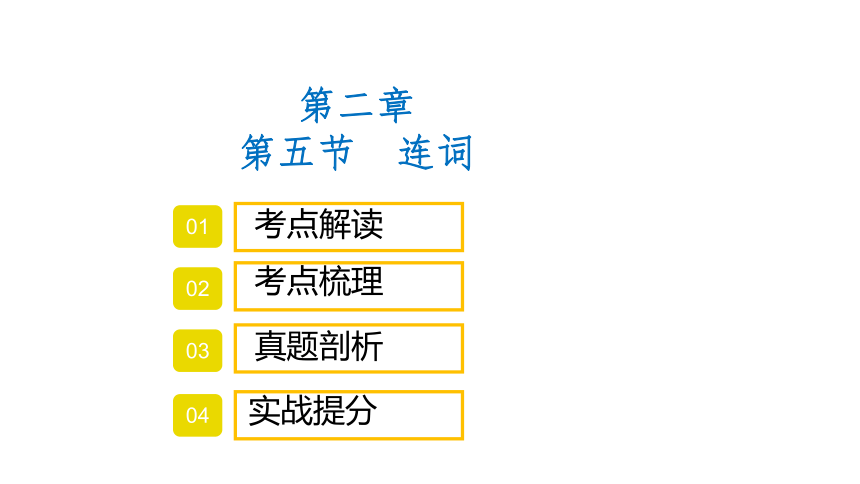 | |
| 格式 | pptx | ||
| 文件大小 | 331.8KB | ||
| 资源类型 | 教案 | ||
| 版本资源 | 牛津译林版 | ||
| 科目 | 英语 | ||
| 更新时间 | 2022-05-10 20:15:32 | ||
图片预览

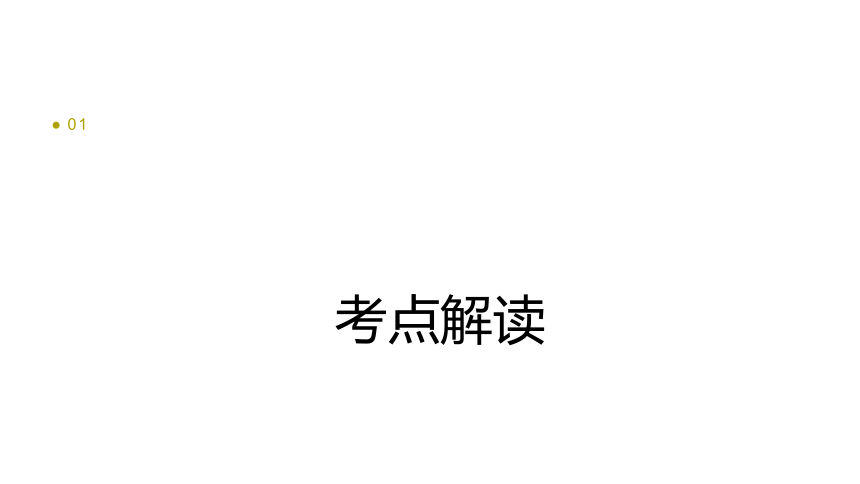
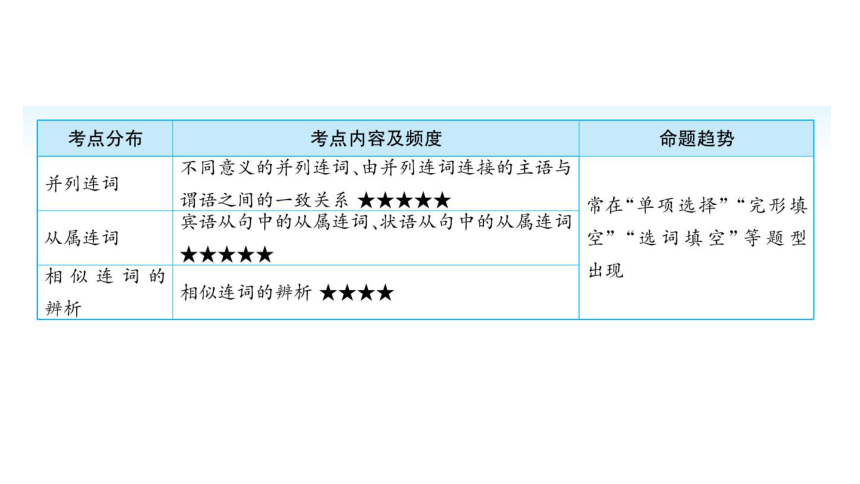
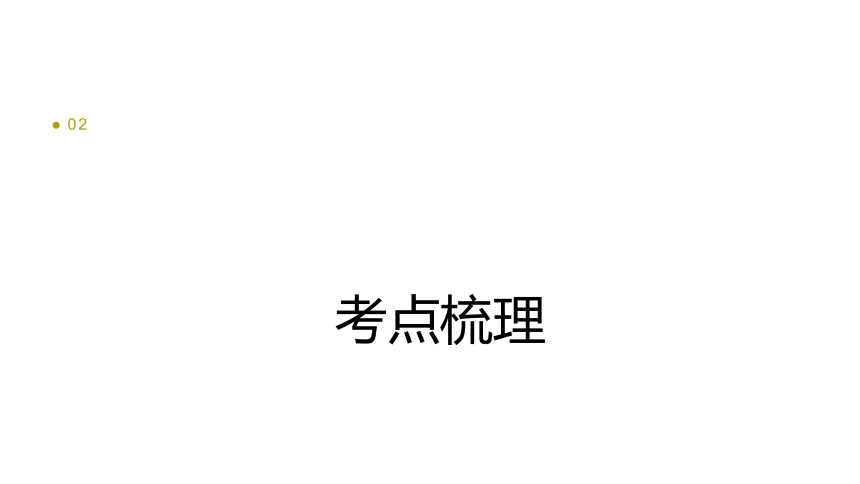
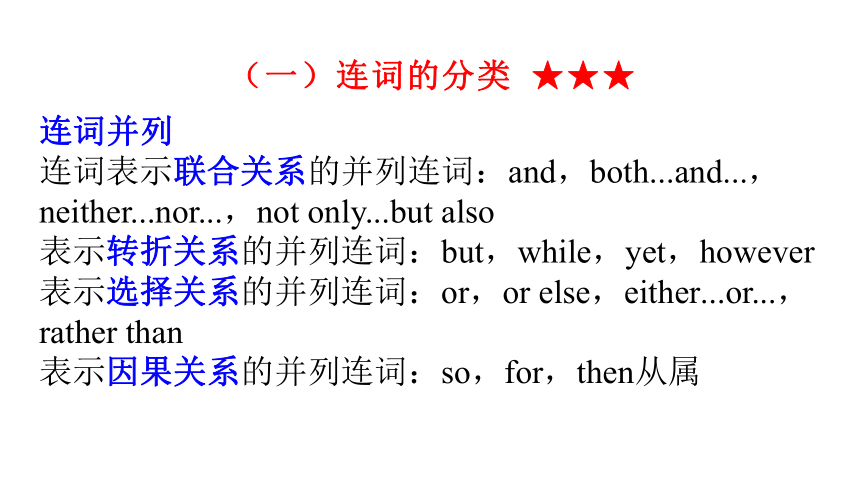
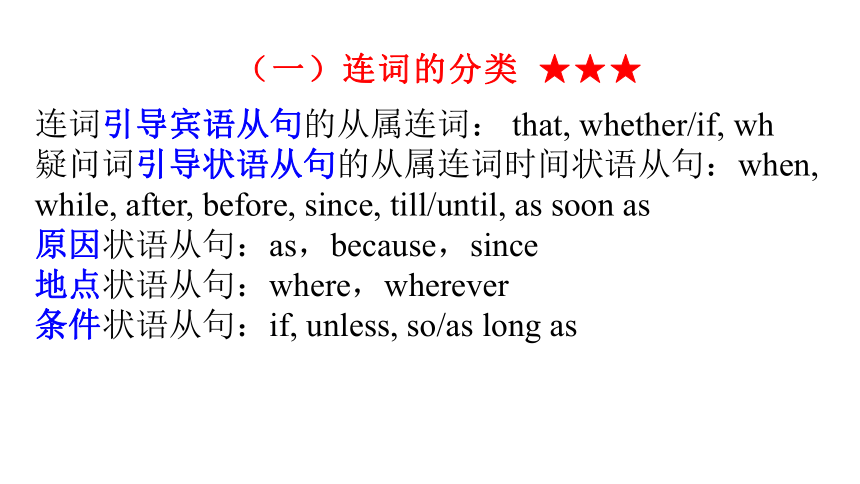
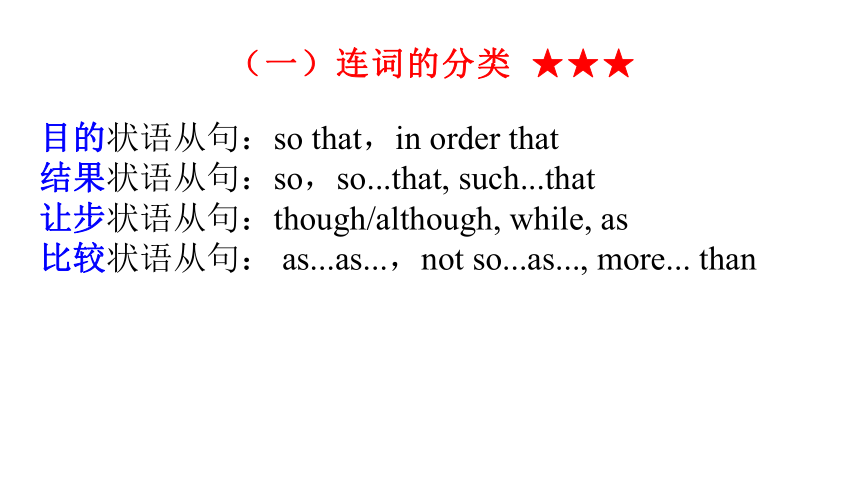
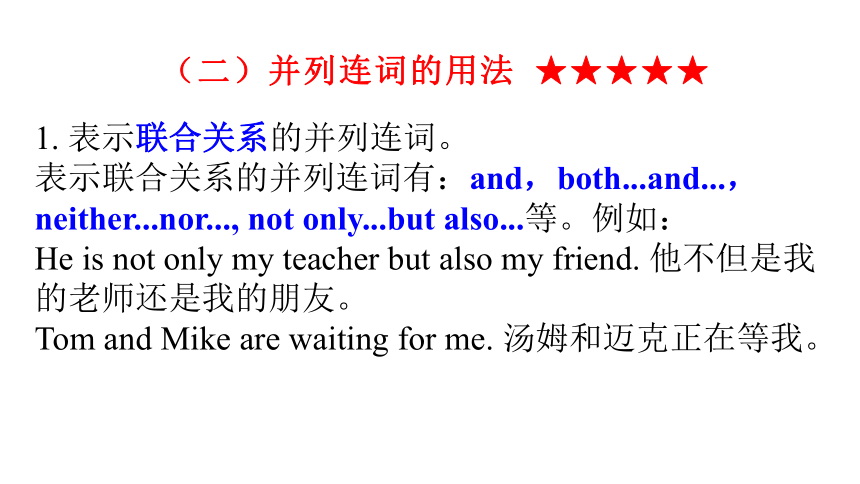
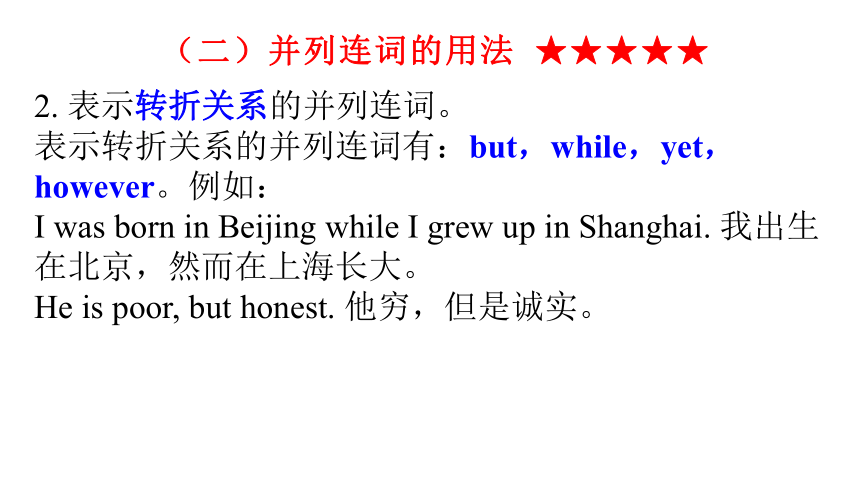
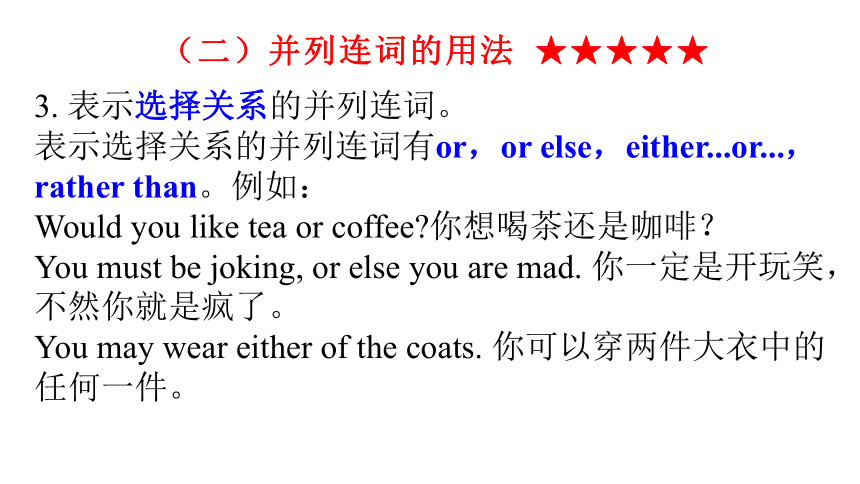
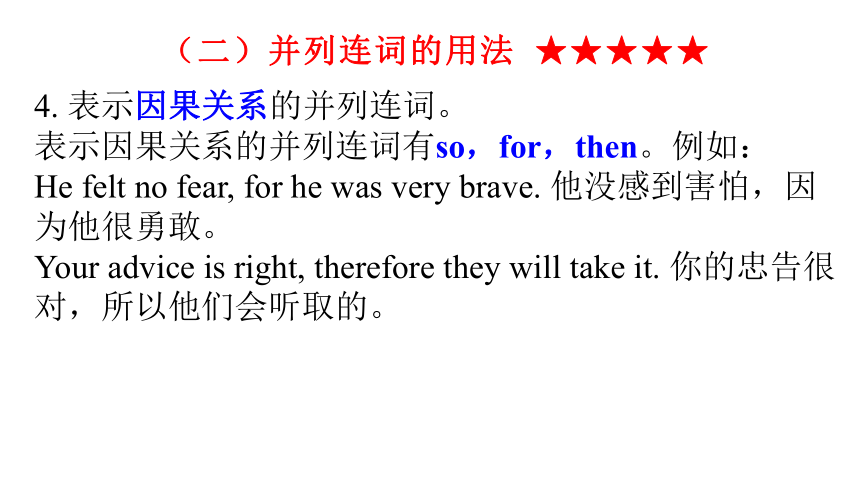
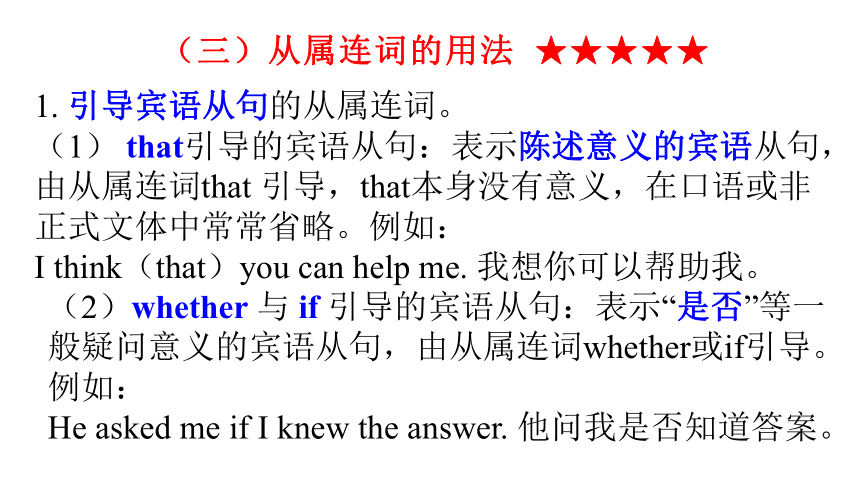
文档简介
(共50张PPT)
01
考点解读
02
03
04
考点梳理
真题剖析
实战提分
第二章
第五节 连词
01
考点解读
02
考点梳理
(一)连词的分类 ★★★
连词并列
连词表示联合关系的并列连词:and,both...and...,neither...nor...,not only...but also
表示转折关系的并列连词:but,while,yet,however
表示选择关系的并列连词:or,or else,either...or...,rather than
表示因果关系的并列连词:so,for,then从属
(一)连词的分类 ★★★
连词引导宾语从句的从属连词: that, whether/if, wh
疑问词引导状语从句的从属连词时间状语从句:when, while, after, before, since, till/until, as soon as
原因状语从句:as,because,since
地点状语从句:where,wherever
条件状语从句:if, unless, so/as long as
(一)连词的分类 ★★★
目的状语从句:so that,in order that
结果状语从句:so,so...that, such...that
让步状语从句:though/although, while, as
比较状语从句: as...as...,not so...as..., more... than
(二)并列连词的用法 ★★★★★
1. 表示联合关系的并列连词。
表示联合关系的并列连词有:and,both...and...,neither...nor..., not only...but also...等。例如:
He is not only my teacher but also my friend. 他不但是我的老师还是我的朋友。
Tom and Mike are waiting for me. 汤姆和迈克正在等我。
(二)并列连词的用法 ★★★★★
2. 表示转折关系的并列连词。
表示转折关系的并列连词有:but,while,yet,however。例如:
I was born in Beijing while I grew up in Shanghai. 我出生在北京,然而在上海长大。
He is poor, but honest. 他穷,但是诚实。
(二)并列连词的用法 ★★★★★
3. 表示选择关系的并列连词。
表示选择关系的并列连词有or,or else,either...or...,rather than。例如:
Would you like tea or coffee 你想喝茶还是咖啡?
You must be joking, or else you are mad. 你一定是开玩笑,不然你就是疯了。
You may wear either of the coats. 你可以穿两件大衣中的任何一件。
(二)并列连词的用法 ★★★★★
4. 表示因果关系的并列连词。
表示因果关系的并列连词有so,for,then。例如:
He felt no fear, for he was very brave. 他没感到害怕,因为他很勇敢。
Your advice is right, therefore they will take it. 你的忠告很对,所以他们会听取的。
(三)从属连词的用法 ★★★★★
1. 引导宾语从句的从属连词。
(1) that引导的宾语从句:表示陈述意义的宾语从句,由从属连词that 引导,that本身没有意义,在口语或非正式文体中常常省略。例如:
I think(that)you can help me. 我想你可以帮助我。
(2)whether 与 if 引导的宾语从句:表示“是否”等一般疑问意义的宾语从句,由从属连词whether或if引导。例如:
He asked me if I knew the answer. 他问我是否知道答案。
(三)从属连词的用法 ★★★★★
(3)wh-疑问词引导的宾语从句:带有“谁,谁的,什么,哪个,什么时候,什么地方,怎样,为什么”等疑问意义的宾语从句,由连接代词 who, whom, whose, what, which和连接副词when, where, how, why引导。例如:
Could you tell me how to get to the post office 你能告诉我怎样到达邮政局吗?
(三)从属连词的用法 ★★★★★
2. 引导状语从句的从属连词。
(1)引导时间状语从句的从属连词有when, while, as, after, before, since, till/until, as soon as 等。例如:
When it rains, I go to school by bus. 下雨时,我坐公共汽车上学。
I didn't go to bed until my father came back last night. 昨晚直到我父亲回来我才睡觉。
(三)从属连词的用法 ★★★★★
(2)引导原因状语从句的从属连词有 as, because, since。例如:
I didn't go to school because I had a cold yesterday. 我昨天没去上学是因为我感冒了。
Since everybody is here, let's begin. 既然大家都在这里,我们开始吧。
(三)从属连词的用法 ★★★★★
(3)引导地点状语从句的从属连词有 where, wherever等。例如:
Wherever she may be, she will be happy. 无论在什么地方她都快乐。
Where there is a hill, there is water. 有山的地方就有水。
(三)从属连词的用法 ★★★★★
(4)引导条件状语从句的从属连词有 if, unless 等。例如:
We will go to the park if it is fine tomorrow. 如果明天天气好的话,我们就去公园。
(5)引导目的状语从句的从属连词有 so that, in order that 等。例如:
He got up early so that he could catch the early bus. 他起床很早,以便他能赶上早班车。
(三)从属连词的用法 ★★★★★
(6)引导结果状语从句的从属连词有 so, so...that, such...that。例如:
She is such a good teacher that we all like her. 她是个好老师,我们都喜欢她。
(7)引导让步状语从句的从属连词有 though/although, while, as等。例如:
Though he is young, he can do many things. 虽然他年轻,可是他会做很多事情。
(三)从属连词的用法 ★★★★★
(8)引导比较状语从句的从属连词有as...as..., not so...as...,more... than等。例如:
She runs as fast as Amy. 她跑得和艾米一样快。
(四)相似连词的辨析 ★★★★
1. if, whether
引导宾语从句时,既可用if,也可用whether 表示“是否”。但 whether后可直接和or not连用,if却不能。引导条件状语从句时,只能用if 表示“如果”。如:
I wonder if/whether it will rain tomorrow.
I don't know whether she will come or not tomorrow.
If I were you, I would invite him to the party.
(四)相似连词的辨析 ★★★★
2. while, when, as
(1)当某事正在进行的时候,又发生了另一件事。while, when, as 都可用来引导表示“背景”的时间状语从句。例如:
As/When/While I was walking down the street, I noticed a police car.
我沿着街道走时,注意到一辆警车。
(四)相似连词的辨析 ★★★★
(2)当两个长动作同时进行的时候,最常用的是while。例如:
While mother was cooking lunch, I was doing my homework. 当妈妈做午饭时,我正在做作业。
(3)当两个动作都表示发展变化的情况时,最常用的是as。例如:
As children get older, they become more and more interested in things around them.
随着孩子的长大,他们越来越对周围的事情感兴趣。
(四)相似连词的辨析 ★★★★
(4)当两个短动作同时发生时,或表示“一边……一边……”时,最常用as。例如:
She looked behind from time to time as she went. 她边走边不时地朝后面看。
(5)当从句的动作先于主句的动作时,通常用when。例如:
When he finished his work, he took a short rest. 当他完成工作后,他进行了短暂的休息。
(四)相似连词的辨析 ★★★★
(6)当从句是瞬间动作,主句是延续性动作时,通常用when。例如:
When John arrived, I was cooking lunch. 当约翰到达时,我正在做饭。
(四)相似连词的辨析 ★★★★
3. as, because, since, for
(1)如果是原因构成句子的最主要部分,一般用because。因此,because引导的从句往往放在句末。例如:
I stayed at home because it rained. 因为下雨,所以我待在家里。
(四)相似连词的辨析 ★★★★
(2)如果原因已被人们所知,或不如句子的其他部分重要,就用as或since。since比as稍微正式一点。as和since 引导的从句一般放在句子的开头。例如:
As he wasn't ready, we left without him. 由于他没有准备,我们没有带他就离开了。
Since I have no money, I can't buy any food. 既然我没有钱,我不能买任何食物。
(四)相似连词的辨析 ★★★★
(3)for用来补充说明一种理由,因此,for引导的从句几乎可以放在括号里。for引导的句子不放在句子的开头。例如:
I decided to stop and have lunch for I was feeling quite hungry.
我决定停下来吃午饭,因为我感觉很饿。
(四)相似连词的辨析 ★★★★
4. so...that, such...that
(1) so...that中的so是个副词,其后只能跟形容词或副词,而such...that中的such是个形容词,后接名词或名词短语。例如:
I'm so tired that I can't walk any farther. 我如此累,以至于我不能再走了。
It was such a hot day that he went swimming. 如此热的天气,以至于他去游泳。
(四)相似连词的辨析 ★★★★
(2)如果在名词之前有many, much, little, few时,用so,不用such。例如:
He has so little education that he is unable to get a job. 他受到的教育很少,以至于他找不到工作。
(四)相似连词的辨析 ★★★★
6. though与although
两个词都表示“虽然”,均不可以与but同时使用,但在句中可和still或yet连用。
although“尽管、虽然”仅作连词,比较正式,一般可以换为though。 though“虽然、尽管、即使”,还可以与even连用(=even if),表示“即使、纵然”,作副词时意思是“然而、不过”,不能放在句首。
03
真题剖析
真题链接
【例1】(2020年广西北部湾经济区)The boy is not very tall, he runs very fast.
A. and B. so C. but D. or
【解析】此题考查并列连词辨析。and表达并列,so表达因果,but表达转折,or表达选择,根据句意可知此处表达转折。故选C。
真题链接
【例2】(2020年成都)Life is like a horse, and
you ride it it rides you.
A. either; or B. neither; nor C. both; and
【解析】此题考查连词短语辨析。句意:人生就像一匹马, 你驾驭它, 它驾驭你。根据句意可知此处表示的是“不是……就是……”。故选A。
真题链接
【例3】(2020年黄冈)—Which do you prefer, tea or coffee
—Either. tea coffee are my favourite.
A. Not only; but also B. Both; and
C. Neither; nor D. Either; or
【解析】此题考查并列连词的用法。句意:“你喜欢哪个,茶还是咖啡?”“两者中任何一个都可以。茶和咖啡我都喜欢。”根据“are”可知此处表示“两者都”。故选B。
真题链接
【例4】(2020年安徽)Our English teacher is nice and patient she is very strict with us.
A. if B. as
C. unless D. though
【解析】此题考查从属连词的用法。分析句意可知,前后两个分句之间为让步关系。故选D。
真题链接
【例5】(2020年南京)We still know little about the moon men have landed on it.
A. if B. since
C. although D. because
【解析】此题考查从属连词的用法。分析句意可知,此处表示让步关系。故选C。
真题链接
【例6】(2020年扬州)Lucy held her head up like a queen Bill was telling his tale.
A. after B. before
C. while D. until
【解析】此题考查从属连词的用法。根据句意可知“当……的时候”符合本句语境,表示两个动作同时进行。故选C。
真题链接
【例7】(2020年苏州)Check what you have written
you hand in your application form.
A. since B. before
C. after D. while
【解析】此题考查连词词义辨析。句意:在你上交申请表 检查一下你所写的内容。根据常识可知是在表格上交之前进行检查。故选B。
真题链接
【例8】(2020年泰州)Father is too tired today. Don't call him it is necessary.
A. if B. unless
C. when D. whether
【解析】此题考查连词词义辨析。句意:父亲今天太疲劳了。 非常必要,不要叫醒他。根据句意可知此处表示除非非常必要,否则不要叫醒他,unless符合语境。故选B。
易错剖析
【例1】—Alice, how do your parents like pop music
— my dad my mom likes it. But they both prefer Beijing Opera.
A. Either; or B. Neither; nor
C. Not only; but also D. Both; and
易错剖析
【解析】此题容易误选C或D。错误的原因:一不理解either...or, neither...nor, not only... but also, both...and的用法。either... or结构表示“不是……就是……”“或者……或者……”,neither...nor...结构意为“既不……也不……”“两者都不……”,not only...but also意为“不仅……而且……”,both...and表示“……和……都……”。二是不理解句意,But they both prefer Beijing Opera. 意为:“但是他们两人更喜欢京剧。”根据句意答案应选A。
易错剖析
【例2】Jenny, put on your coat you will catch a cold.
A. but B. and
C. or D. so
【解析】此题容易误选B或D。错误的原因:一不理解并列连词“but, and, or, so”的用法,二不理解本句的意思。本题考查常用句型“祈使句+or+将来时句子”。前后两个分句表示转折时用or,表示并列或递进时则用and。so意为 “所以”;but 意为“但是”,表示转折。句意为:“珍妮,穿上你的大衣,否则你会感冒的”。根据句意答案应选C。
04
实战提分
基础过关
根据句子意思,在横线上填入适当的连词。
1. My mother is ill, I have to stay at home and look after her.
2. He has a lot of money, he spends little.
3. Get up early, you can't catch the bus.
4. Simon got a “C” in maths test, he had tried his best.
5. my father my mother is a doctor. They are teachers.
so
but
or
though
Neither
nor
拓展提升
从下列每小题所给的选项中,选出可以填入空白处的最佳选项。
1. (2019年柳州)—May I go and play with Dick, Mum
—No, you can't go out your homework is being done.
A. before B. as C. until
2. (2020年天津)You'd better tidy up your room
your father comes back.
A. so B. or
C. before D. but
拓展提升
3. (2020年丹东)I don't like Sun Cinema it has bad service.
A. because B. although
C. unless D. until
4. Many people like reading newspapers they can learn what's happening in the world.
A. so that B. ever since
C. as soon as D. even though
拓展提升
5. His mother doesn't like to throw away old things
they are useless.
A. but B. because
C. even if D. so that
6. Victoria, hurry up! we can't arrive there on time.
A. Or B. So
C. But D. And
拓展提升
7. —Would you like to come to my house for dinner tonight
—I'd love to, I have lots of work to do.
A. so B. or
C. and D. but
8. None of the shoes in the shop fit me well. They are
too big too small.
A. both; and
B. either; or
C. neither; nor
D. not only; but also
拓展提升
9. Hold your dream, you might regret some day.
A. and B. or
C. but D. so
10. Nobody can hear you you speak in a louder voice.
A. unless B. if
C. when D. after
本 课 结 束
01
考点解读
02
03
04
考点梳理
真题剖析
实战提分
第二章
第五节 连词
01
考点解读
02
考点梳理
(一)连词的分类 ★★★
连词并列
连词表示联合关系的并列连词:and,both...and...,neither...nor...,not only...but also
表示转折关系的并列连词:but,while,yet,however
表示选择关系的并列连词:or,or else,either...or...,rather than
表示因果关系的并列连词:so,for,then从属
(一)连词的分类 ★★★
连词引导宾语从句的从属连词: that, whether/if, wh
疑问词引导状语从句的从属连词时间状语从句:when, while, after, before, since, till/until, as soon as
原因状语从句:as,because,since
地点状语从句:where,wherever
条件状语从句:if, unless, so/as long as
(一)连词的分类 ★★★
目的状语从句:so that,in order that
结果状语从句:so,so...that, such...that
让步状语从句:though/although, while, as
比较状语从句: as...as...,not so...as..., more... than
(二)并列连词的用法 ★★★★★
1. 表示联合关系的并列连词。
表示联合关系的并列连词有:and,both...and...,neither...nor..., not only...but also...等。例如:
He is not only my teacher but also my friend. 他不但是我的老师还是我的朋友。
Tom and Mike are waiting for me. 汤姆和迈克正在等我。
(二)并列连词的用法 ★★★★★
2. 表示转折关系的并列连词。
表示转折关系的并列连词有:but,while,yet,however。例如:
I was born in Beijing while I grew up in Shanghai. 我出生在北京,然而在上海长大。
He is poor, but honest. 他穷,但是诚实。
(二)并列连词的用法 ★★★★★
3. 表示选择关系的并列连词。
表示选择关系的并列连词有or,or else,either...or...,rather than。例如:
Would you like tea or coffee 你想喝茶还是咖啡?
You must be joking, or else you are mad. 你一定是开玩笑,不然你就是疯了。
You may wear either of the coats. 你可以穿两件大衣中的任何一件。
(二)并列连词的用法 ★★★★★
4. 表示因果关系的并列连词。
表示因果关系的并列连词有so,for,then。例如:
He felt no fear, for he was very brave. 他没感到害怕,因为他很勇敢。
Your advice is right, therefore they will take it. 你的忠告很对,所以他们会听取的。
(三)从属连词的用法 ★★★★★
1. 引导宾语从句的从属连词。
(1) that引导的宾语从句:表示陈述意义的宾语从句,由从属连词that 引导,that本身没有意义,在口语或非正式文体中常常省略。例如:
I think(that)you can help me. 我想你可以帮助我。
(2)whether 与 if 引导的宾语从句:表示“是否”等一般疑问意义的宾语从句,由从属连词whether或if引导。例如:
He asked me if I knew the answer. 他问我是否知道答案。
(三)从属连词的用法 ★★★★★
(3)wh-疑问词引导的宾语从句:带有“谁,谁的,什么,哪个,什么时候,什么地方,怎样,为什么”等疑问意义的宾语从句,由连接代词 who, whom, whose, what, which和连接副词when, where, how, why引导。例如:
Could you tell me how to get to the post office 你能告诉我怎样到达邮政局吗?
(三)从属连词的用法 ★★★★★
2. 引导状语从句的从属连词。
(1)引导时间状语从句的从属连词有when, while, as, after, before, since, till/until, as soon as 等。例如:
When it rains, I go to school by bus. 下雨时,我坐公共汽车上学。
I didn't go to bed until my father came back last night. 昨晚直到我父亲回来我才睡觉。
(三)从属连词的用法 ★★★★★
(2)引导原因状语从句的从属连词有 as, because, since。例如:
I didn't go to school because I had a cold yesterday. 我昨天没去上学是因为我感冒了。
Since everybody is here, let's begin. 既然大家都在这里,我们开始吧。
(三)从属连词的用法 ★★★★★
(3)引导地点状语从句的从属连词有 where, wherever等。例如:
Wherever she may be, she will be happy. 无论在什么地方她都快乐。
Where there is a hill, there is water. 有山的地方就有水。
(三)从属连词的用法 ★★★★★
(4)引导条件状语从句的从属连词有 if, unless 等。例如:
We will go to the park if it is fine tomorrow. 如果明天天气好的话,我们就去公园。
(5)引导目的状语从句的从属连词有 so that, in order that 等。例如:
He got up early so that he could catch the early bus. 他起床很早,以便他能赶上早班车。
(三)从属连词的用法 ★★★★★
(6)引导结果状语从句的从属连词有 so, so...that, such...that。例如:
She is such a good teacher that we all like her. 她是个好老师,我们都喜欢她。
(7)引导让步状语从句的从属连词有 though/although, while, as等。例如:
Though he is young, he can do many things. 虽然他年轻,可是他会做很多事情。
(三)从属连词的用法 ★★★★★
(8)引导比较状语从句的从属连词有as...as..., not so...as...,more... than等。例如:
She runs as fast as Amy. 她跑得和艾米一样快。
(四)相似连词的辨析 ★★★★
1. if, whether
引导宾语从句时,既可用if,也可用whether 表示“是否”。但 whether后可直接和or not连用,if却不能。引导条件状语从句时,只能用if 表示“如果”。如:
I wonder if/whether it will rain tomorrow.
I don't know whether she will come or not tomorrow.
If I were you, I would invite him to the party.
(四)相似连词的辨析 ★★★★
2. while, when, as
(1)当某事正在进行的时候,又发生了另一件事。while, when, as 都可用来引导表示“背景”的时间状语从句。例如:
As/When/While I was walking down the street, I noticed a police car.
我沿着街道走时,注意到一辆警车。
(四)相似连词的辨析 ★★★★
(2)当两个长动作同时进行的时候,最常用的是while。例如:
While mother was cooking lunch, I was doing my homework. 当妈妈做午饭时,我正在做作业。
(3)当两个动作都表示发展变化的情况时,最常用的是as。例如:
As children get older, they become more and more interested in things around them.
随着孩子的长大,他们越来越对周围的事情感兴趣。
(四)相似连词的辨析 ★★★★
(4)当两个短动作同时发生时,或表示“一边……一边……”时,最常用as。例如:
She looked behind from time to time as she went. 她边走边不时地朝后面看。
(5)当从句的动作先于主句的动作时,通常用when。例如:
When he finished his work, he took a short rest. 当他完成工作后,他进行了短暂的休息。
(四)相似连词的辨析 ★★★★
(6)当从句是瞬间动作,主句是延续性动作时,通常用when。例如:
When John arrived, I was cooking lunch. 当约翰到达时,我正在做饭。
(四)相似连词的辨析 ★★★★
3. as, because, since, for
(1)如果是原因构成句子的最主要部分,一般用because。因此,because引导的从句往往放在句末。例如:
I stayed at home because it rained. 因为下雨,所以我待在家里。
(四)相似连词的辨析 ★★★★
(2)如果原因已被人们所知,或不如句子的其他部分重要,就用as或since。since比as稍微正式一点。as和since 引导的从句一般放在句子的开头。例如:
As he wasn't ready, we left without him. 由于他没有准备,我们没有带他就离开了。
Since I have no money, I can't buy any food. 既然我没有钱,我不能买任何食物。
(四)相似连词的辨析 ★★★★
(3)for用来补充说明一种理由,因此,for引导的从句几乎可以放在括号里。for引导的句子不放在句子的开头。例如:
I decided to stop and have lunch for I was feeling quite hungry.
我决定停下来吃午饭,因为我感觉很饿。
(四)相似连词的辨析 ★★★★
4. so...that, such...that
(1) so...that中的so是个副词,其后只能跟形容词或副词,而such...that中的such是个形容词,后接名词或名词短语。例如:
I'm so tired that I can't walk any farther. 我如此累,以至于我不能再走了。
It was such a hot day that he went swimming. 如此热的天气,以至于他去游泳。
(四)相似连词的辨析 ★★★★
(2)如果在名词之前有many, much, little, few时,用so,不用such。例如:
He has so little education that he is unable to get a job. 他受到的教育很少,以至于他找不到工作。
(四)相似连词的辨析 ★★★★
6. though与although
两个词都表示“虽然”,均不可以与but同时使用,但在句中可和still或yet连用。
although“尽管、虽然”仅作连词,比较正式,一般可以换为though。 though“虽然、尽管、即使”,还可以与even连用(=even if),表示“即使、纵然”,作副词时意思是“然而、不过”,不能放在句首。
03
真题剖析
真题链接
【例1】(2020年广西北部湾经济区)The boy is not very tall, he runs very fast.
A. and B. so C. but D. or
【解析】此题考查并列连词辨析。and表达并列,so表达因果,but表达转折,or表达选择,根据句意可知此处表达转折。故选C。
真题链接
【例2】(2020年成都)Life is like a horse, and
you ride it it rides you.
A. either; or B. neither; nor C. both; and
【解析】此题考查连词短语辨析。句意:人生就像一匹马, 你驾驭它, 它驾驭你。根据句意可知此处表示的是“不是……就是……”。故选A。
真题链接
【例3】(2020年黄冈)—Which do you prefer, tea or coffee
—Either. tea coffee are my favourite.
A. Not only; but also B. Both; and
C. Neither; nor D. Either; or
【解析】此题考查并列连词的用法。句意:“你喜欢哪个,茶还是咖啡?”“两者中任何一个都可以。茶和咖啡我都喜欢。”根据“are”可知此处表示“两者都”。故选B。
真题链接
【例4】(2020年安徽)Our English teacher is nice and patient she is very strict with us.
A. if B. as
C. unless D. though
【解析】此题考查从属连词的用法。分析句意可知,前后两个分句之间为让步关系。故选D。
真题链接
【例5】(2020年南京)We still know little about the moon men have landed on it.
A. if B. since
C. although D. because
【解析】此题考查从属连词的用法。分析句意可知,此处表示让步关系。故选C。
真题链接
【例6】(2020年扬州)Lucy held her head up like a queen Bill was telling his tale.
A. after B. before
C. while D. until
【解析】此题考查从属连词的用法。根据句意可知“当……的时候”符合本句语境,表示两个动作同时进行。故选C。
真题链接
【例7】(2020年苏州)Check what you have written
you hand in your application form.
A. since B. before
C. after D. while
【解析】此题考查连词词义辨析。句意:在你上交申请表 检查一下你所写的内容。根据常识可知是在表格上交之前进行检查。故选B。
真题链接
【例8】(2020年泰州)Father is too tired today. Don't call him it is necessary.
A. if B. unless
C. when D. whether
【解析】此题考查连词词义辨析。句意:父亲今天太疲劳了。 非常必要,不要叫醒他。根据句意可知此处表示除非非常必要,否则不要叫醒他,unless符合语境。故选B。
易错剖析
【例1】—Alice, how do your parents like pop music
— my dad my mom likes it. But they both prefer Beijing Opera.
A. Either; or B. Neither; nor
C. Not only; but also D. Both; and
易错剖析
【解析】此题容易误选C或D。错误的原因:一不理解either...or, neither...nor, not only... but also, both...and的用法。either... or结构表示“不是……就是……”“或者……或者……”,neither...nor...结构意为“既不……也不……”“两者都不……”,not only...but also意为“不仅……而且……”,both...and表示“……和……都……”。二是不理解句意,But they both prefer Beijing Opera. 意为:“但是他们两人更喜欢京剧。”根据句意答案应选A。
易错剖析
【例2】Jenny, put on your coat you will catch a cold.
A. but B. and
C. or D. so
【解析】此题容易误选B或D。错误的原因:一不理解并列连词“but, and, or, so”的用法,二不理解本句的意思。本题考查常用句型“祈使句+or+将来时句子”。前后两个分句表示转折时用or,表示并列或递进时则用and。so意为 “所以”;but 意为“但是”,表示转折。句意为:“珍妮,穿上你的大衣,否则你会感冒的”。根据句意答案应选C。
04
实战提分
基础过关
根据句子意思,在横线上填入适当的连词。
1. My mother is ill, I have to stay at home and look after her.
2. He has a lot of money, he spends little.
3. Get up early, you can't catch the bus.
4. Simon got a “C” in maths test, he had tried his best.
5. my father my mother is a doctor. They are teachers.
so
but
or
though
Neither
nor
拓展提升
从下列每小题所给的选项中,选出可以填入空白处的最佳选项。
1. (2019年柳州)—May I go and play with Dick, Mum
—No, you can't go out your homework is being done.
A. before B. as C. until
2. (2020年天津)You'd better tidy up your room
your father comes back.
A. so B. or
C. before D. but
拓展提升
3. (2020年丹东)I don't like Sun Cinema it has bad service.
A. because B. although
C. unless D. until
4. Many people like reading newspapers they can learn what's happening in the world.
A. so that B. ever since
C. as soon as D. even though
拓展提升
5. His mother doesn't like to throw away old things
they are useless.
A. but B. because
C. even if D. so that
6. Victoria, hurry up! we can't arrive there on time.
A. Or B. So
C. But D. And
拓展提升
7. —Would you like to come to my house for dinner tonight
—I'd love to, I have lots of work to do.
A. so B. or
C. and D. but
8. None of the shoes in the shop fit me well. They are
too big too small.
A. both; and
B. either; or
C. neither; nor
D. not only; but also
拓展提升
9. Hold your dream, you might regret some day.
A. and B. or
C. but D. so
10. Nobody can hear you you speak in a louder voice.
A. unless B. if
C. when D. after
本 课 结 束
同课章节目录
- 词法
- 名词
- 动词和动词短语
- 动词语态
- 动词时态
- 助动词和情态动词
- 非谓语动词
- 冠词
- 代词
- 数词和量词
- 形容词副词及其比较等级
- 介词和介词短语
- 连词和感叹词
- 构词法
- 相似、相近词比较
- 句法
- 陈述句
- 一般疑问句和否定疑问句
- 特殊疑问句及选择疑问句
- 反意疑问句
- 存在句(There be句型)
- 宾语从句
- 定语从句
- 状语从句
- 主谓一致问题
- 简单句
- 并列句
- 复合句
- 主谓一致
- 主、表语从句
- 名词性从句
- 直接引语和间接引语
- 虚拟语气
- 感叹句
- 强调句
- 倒装句
- 祈使句
- 句子的成分
- 句子的分类
- 题型专区
- 单项选择部分
- 易错题
- 完形填空
- 阅读理解
- 词汇练习
- 听说训练
- 句型转换
- 补全对话
- 短文改错
- 翻译
- 书面表达
- 任务型阅读
- 语法填空
- 其他资料
